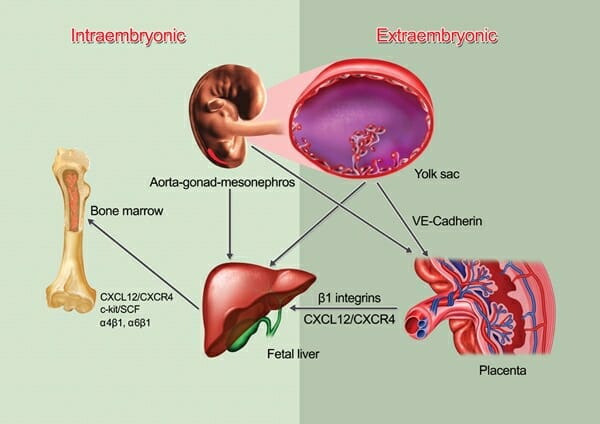Hematopoiesis: Hematopoiesis happens to be the process of formation of both red and white blood cells. In this post, you will learn what it’s all about.
It’s the process of the formation of blood cells and the way they are formed, develops and finally mature into adults.
The specific term is also known as tracks or pathways of blood formation. In the formation of blood cells beginning and development, there are a series of steps that a blood cell has to undergo to transform into a matured cell.
In short, the term hematopoiesis refers to the process of blood cell development that actually begins with hematopoietic stem cells that go through a series of certain steps finally producing the matured blood cells.
There are a few other terms that relate to the formation of blood cells (RBC, WBC, Platelets) that are known as hemopoiesis, hematogenesis or hemogenesis.
There can be different sites that are involved in the production of matured blood cells. The different sites that are involved in the blood formation either include a baby still in the womb, attains infancy and in the adult stages.
For example, when a child develops in uterus, the developing baby uses a plethora of sites in the body for the blood formation (hematopoiesis) that includes spleen, liver, lymph nodes, and thymus along with the bone marrow. But after the child is born, the main site of blood formation becomes bone marrow.
In this section, we are going to update you with the extramedullary hematopoiesis which is the formation of matured blood cells at any other site except bone marrow.
Most commonly, extramedullary hematopoiesis happens to be a common term for a baby in the womb, but the conditions really means a sign of medical ailment or any kind of deformity if it happens in a young adult individual. This is because the main or primary site of blood production can’t be any other location except bone marrow.
When it happens such that all other sites except bone marrow start taking part actively in producing matured blood cells at a slow or high speed, it simply means that the bone marrow is unable to produce the required quantity of RBC (Red Blood Cells) to meet the huge demand of the body.
Also Read: Crippling Depression Signs, Symptoms & the Ways to Manage It
What Is Hematopoietic?
The word hematopoiesis defines the scenario in the same way as the adjective hematopoietic relates:
- Hematopoietic stem cell transplant is also known as bone marrow transplant. It’s also known as stem cell transplant that basically involves the procedure of transplanting stem cells from a donor to the recipient. After this procedure, the recipient starts making his own new and matured red blood cells (RBC), white blood cells (WBC), and platelets together. As you know, platelets help the blood to clot.
- There is another condition that sometimes arises due to the irregularity of blood cells known as Hematopoietic malignancy. It basically refers to the cancer of the matured blood cells. Such types of malignancies also include lymphoma, myeloma and leukemia.
- Hematopoietic neoplasm basically covers a huge range of blood disorders. Out of all those ones, there are some that represent chronic conditions. However, there are others that simply progress with some sort of serious issues or complications with somewhat decreased survival rates.
- In the same ways, Hematopoietic cell line or lineage relates to several branches or tracks in your blood cell family tree. In the overall process, a progenitor cell simply transforms into a matured blood cell.
Hematopoiesis: An Overview
Do you know that blood contains a variety of blood cells? It actually contains a number of cells that include a mixture of blood cells, fluids and other cell products.
Please know that billions of matured blood cells get replaced each and every day after they complete their life spans.
As you know, different blood cells types have different life spans. For example, the healthy and matured blood cells live up to 120 days before they are replaced.
Ref:
https://en.wikipedia.org/wiki/Haematopoiesis
https://www.medicalnewstoday.com/articles
